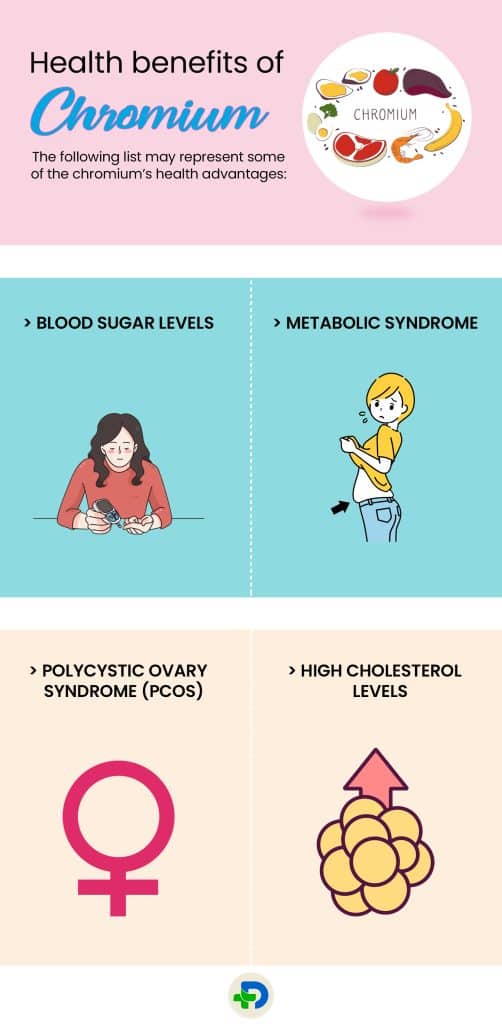Chromium and its health benefits

- Chromium
- 16 Aug 2023
Overview
What is Chromium ?
Chromium is a crucial trace mineral in a variety of foods. Individuals only require minimal amounts of this metallic element. It is available in two major types. The human diet naturally contains chromium III, an important trace element, but chromium VI is a hazardous by-product of industry.1Overview | Researched based study from Nlm.nih.gov This article will discuss Chromium III’s role, health benefits, side effects when taken as supplements, and deficiencies.

Facts
Facts about chromium
A few chromium-related facts could be as follows:
- Chromium has an atomic number of 24, represented by the letter Cr.
- Fruits and vegetables have different amounts of chromium depending on the land and water where they were grown.
- The diet of the animal determines how much chromium is in the meat.
- When processed or cooked on stainless steel equipment, minute amounts of chromium are transferred to the food.
- Chromium VI consumption has been associated with lung cancer, cancer of para nasal sinuses, and stomach cancers.3Facts | Researched based study from Nlm.nih.gov
Functions
Biological functions of chromium
The functions of chromium in our bodies include the following:
- Chromium improves the efficiency of insulin.2Functions | Researched based study from Nlm.nih.gov
- Regulates carbohydrate, lipid, and protein metabolism and storage.
- Coenzymes in several metabolic reactions that occur naturally throughout the body.
Sources
What are the sources of chromium ?
Chromium-rich food
- Vegetables – broccoli, lettuce, potatoes, and green beans.
- Fruits – apples, grapes, bananas, oranges, and tomatoes.
- Animal sources – beef, turkey, and ham.
- Dairy products – milk and cheese.
- Nuts, spices, and whole grain products like bread.
- Brewer’s yeast, wine, and beer.
- Mother’s milk to newborns.
Supplements for chromium
- There are numerous types of chromium, including chromium nicotinate, chromium picolinate, chromium histidinate, chromium chloride, chromium-enriched yeast, and glucose tolerance factor chromium (GTF) 4Sources| Researched based study from Mountsinai.org
- Trivalent chromium, in particular, is a necessary trace element that some people use as a supplement.
- For some people, chromium picolinate supplements might be beneficial, but the best way to get enough chromium is through a healthy diet, not pills.
Dosage
Dietary requirement
Adequate Intake (AI) – This intake level guarantees nutritional adequacy and is used by people when there is insufficient data to create an RDA.5Dosage | Researched based study from Nih.gov
Chromium’s adequate intakes (AIs) may include the following
For newborns and infants
- Birth to 6 months – 0.2 mcg/day
- 7 to 12 months – 5.5 mcg/day
For kids
- 1 to 3 years – 11 mcg/day
- 4 to 8 years – 15 mcg/day
For adolescents
- 9 to 13 years – for males – 25 mcg/day, females – 21 mcg/day
- 14 to 18 years – for males – 35 mcg/day, females – 24 mcg
For adults
- 19 to 50 years – for men – 35 mcg/day, women – 25 mcg/day
- 51 years and above – men – 30 mcg/day, women – 20 mcg/day
For pregnant women
- 14 to 18 years – 29 mcg/day
- 19 to 50 years – 30 mcg/day
For lactating women
- 14 to 18 years – 44 mcg/day
- 19 to 50 years – 45 mcg/day
Benefits

Health benefits of chromium
The following list may represent some of the chromium’s health advantages:
Blood sugar levels
- Chromium is said to improve blood sugar levels and insulin activity, especially in type 2 diabetic patients with a chromium deficiency.6Benefits | Researched based study from Nlm.nih.gov
Metabolic syndrome
- Chromium lowers the risk of metabolic syndromes, like high blood sugar, high blood fat levels, elevated blood pressure, and low amounts of good cholesterol.7Benefits | Researched based study from Nature.com
Polycystic ovary syndrome (PCOS)
- Chromium modulates the metabolism of fats and carbohydrates, enhances body composition, and lowers body mass index (BMI). It balances the menstrual cycle and raises the chances of ovulation. (8)
High cholesterol levels
- By lowering serum levels of total triglycerides, cholesterol, and LDL while raising levels of HDL, chromium malate enhances lipid metabolism 8Benefits | Researched based study from Sciencedirect.com .
Vulnerability
People at risk of deficiency
The following conditions raise a person’s risk of deficiency:
- Patients on total parenteral nutrition (TPN) following trauma, infection, surgery, and burns.9Vulnerability | Researched based study from Nlm.nih.gov
- Malabsorption.
- Malnutrition.
- Older adults.
- Pregnant women.
Symptoms
What are the common symptoms of deficiency ?
Despite being rare, chromium deficiency can cause the following symptoms:
Less effective cholesterol management, increasing the risk of atherosclerosis and heart disease.
Reduced insulin tolerance, which results in hyperglycemia and symptoms like
- Abdominal pain.
- Increased urinary frequency.
- Increased thirst.
- Weight loss.
- Tremors.
- Confusion.
- Pins and needles sensation in arms, hands, legs, or feet.
Side effects
What are the side effects of chromium ?
Side effects of chromium may include the following
- Irregular heartbeats (occasional)
- Headaches.
- Sleep disturbances.
- Mood changes.
- Allergic reactions.
- Watery stool.
- Anemia.
- Vertigo.
- Rashes.
Toxicity
Overdose toxicity
Overdose from supplementation may cause the following problems
- Stomach problems.
- Kidney damage.
- Low blood sugar.
- Liver damage.
- Fast, irregular heartbeats.
- Rhabdomyolysis – skeletal muscle injury.
Precautions
What precautions one should take while consuming chromium ?
- People with anemia, liver disease, or kidney disease should not consume chromium without consulting their doctors.
- Children should not be given chromium supplements and should not be taken by pregnant or breastfeeding mothers.
- Chromium may exacerbate psychiatric conditions like schizophrenia and anxiety symptoms.
- People allergic to leather or chromate may also be sensitive to chromium.
- Due to the potential for side effects and drug interactions, dietary supplements should only be taken under the supervision of a qualified healthcare expert.
Interactions
Interaction of chromium with medicines
Chromium supplements can interact with the following medications:
Thyroid medicines
- Any chromium supplement should be taken by patients at least three to four hours before or after any thyroid medicine as it hampered absorption. For example – levothyroxine.5Interactions | Researched based study from Nih.gov
Anti-diabetics
Combining chromium with Insulin or other diabetic medication like metformin may result in low blood sugar levels.5Interactions | Researched based study from Nih.gov
Ascorbic acid
- Chromium absorption is enhanced by vitamin C or ascorbic acid.
Pain killers
- Pain killers like aspirin may increase chromium absorption.5Interactions | Researched based study from Nih.gov
Other drugs
- Drugs like oxalates and antacids inhibit chromium absorption.
Takeaway
Takeaway
A balanced diet is crucial in maintaining good health and preventing disease. it is essential for how all nutrients work together and not for any individual component. When it is impossible to meet nutrient requirements for one or more nutrients, like in patients with malabsorption syndrome, fortified foods, and dietary supplements can be helpful. But, like any other supplementation, it is best to speak with a medical professional before using chromium.
Any feedback on this article?
 This Articles content was accurate
This Articles content was accurate Very Informative Article
Very Informative Article I have a question or a comment
I have a question or a comment
 This article contains inaccurate content
This article contains inaccurate content This article was not helpful
This article was not helpful I have a question or a comment
I have a question or a comment
We appreciate your helpful feedback!
Checkout our social pages
References
-
National Library of Medicine
Chromium | Overview
-
National Library of Medicine
Chromium | Functions
-
National Library of Medicine
The Effect of Hexavalent Chromium on the Incidence and Mortality of Human Cancers: A Meta-Analysis Based on Published Epidemiological Cohort Studies | Facts
-
Mount Sinai
Chromium | Sources
-
National Institutes of Health
Chromium-Fact Sheet for Health Professionals | Dosage | Interactions
-
National Library of Medicine
Chromium Supplementation; Negotiation with Diabetes Mellitus, Hyperlipidemia and Depression | Benefits
-
Springer Nature Limited
Chromium exposure and incidence of metabolic syndrome among American young adults over a 23-year follow-up: the CARDIA Trace Element Study | Benefits
-
Science Direct
Effects of chromium supplementation on lipid profile in patients with type 2 diabetes: A systematic review and dose-response meta-analysis of randomized controlled trials | Benefits
-
National Library of Medicine
Chromium Deficiency | Vulnerability





































